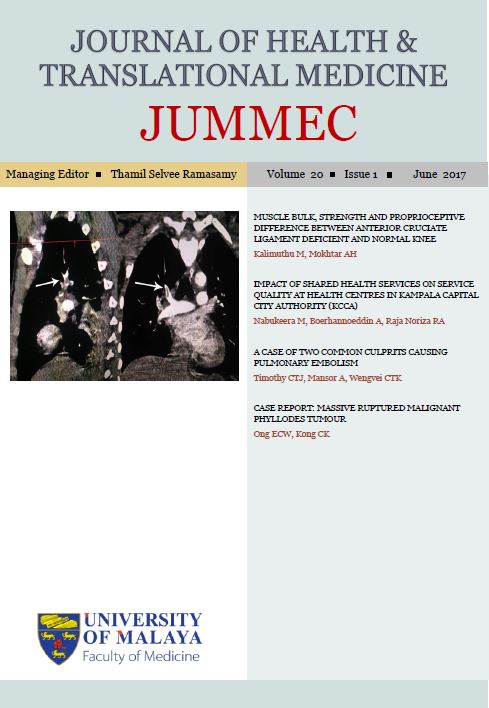IMPACT OF SHARED HEALTH SERVICES ON SERVICE QUALITY AT HEALTH CENTRES IN KAMPALA CAPITAL CITY AUTHORITY (KCCA)
DOI:
https://doi.org/10.22452/jummec.vol20no1.2Abstract
The study aimed to assess whether sharing of health services improved service quality in health centers in
Kampala Capital City Authority (KCCA). With multi-stage sampling, data was gathered by face to face interviews,
via translators from residents in the five divisions of KCCA, using a questionnaire. Schedules were made with
Local Council I chairmen, and support to fill in the questionnaire was given to the respondents. The statistical
methods used for analysis included a Chi-square, Spearman correlations and hierarchical regression.
The study found that regarding tangibility, sharing health services significantly determines the number of
modern medical equipments (p=0.000) and the number of medical personnel that had a neat and professional
appearance (p=0.000) but did not determine the number of visually appealing health facilities (p=0.386).
Recentralizing health care changed the mode of delivery. Health workers were responsive, reliable and provide
better care for patients. There was increased availability of basic medical equipment, and health workers
were neater in appearance with increased confidence and hence were better able to provide for the safety
of residents.
Downloads
Downloads
Published
Issue
Section
License
All authors agree that the article, if editorially accepted for publication, shall be licensed under the Creative Commons Attribution License 4.0 to allow others to freely access, copy and use research provided the author is correctly attributed, unless otherwise stated. All articles are available online without charge or other barriers to access. However, anyone wishing to reproduce large quantities of an article (250+) should inform the publisher. Any opinion expressed in the articles are those of the authors and do not reflect that of the University of Malaya, 50603 Kuala Lumpur, Malaysia.


